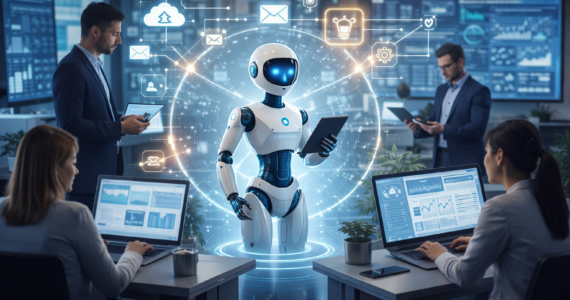Why AI Is Considered A Game Changer For Enterprise Mobility
Mobility isn’t a new name in the world of enterprise. Industries belonging to various segments have started adopting mobility as an invincible feature.
According to a report released in 2015, the enterprise mobility management software market has increased from $ 1,110.2 million in 2013 to $ 1,791.9 million by 2015.
The figures commendably narrate the excellence offered by enterprise mobility, availing enterprises a chance to overcome the obstacles of physical space. However, with time smartphones got smarter, eventually allowing enterprise mobility to touch new benchmarks.
One such change came with the introduction of Artificial Intelligence. AI can be defined as computer software that is designed to interact as humans do. A few common examples of this include Alexa, Siri, facial recognition technology, and much more.
How Is Artificial Intelligence Changing Enterprise Mobility?
AI is no longer a part of some science fiction. Though the fact is that mobile and cloud computing, they have created a fertile ground for AI technology. Some live examples of this are virtual assistants and chatbots. AI chatbot technology is ruling the world of enterprise mobility.
Do you remember the last website you visited? And do you remember that popup window coming from the bottom right corner (mostly)?
Well, presuming the reply to be a yes, the delighting integration is a small part of AI.
The Game’s About to Change
While on one hand enterprise mobility is adding ease in working, on the other side artificial intelligence takes it a step ahead with its innovative and productive ‘smart technology’.
Recently a Japan-based insurance firm, Fukoku Mutual Life Insurance has redundant its 34 employees, replacing them with Watson Explorer by IBM.
While the employees who’ll be laid off by the company somewhere in March consider this as a curse, the company believes that the installed technology will save around 1.2 Million USD every year.
The system that the Insurance Company has installed works on cognitive technology and can act and think like humans. No doubt that looking at the country’s aging population and its command of robotics we can presume space to be the prime location for such tests.
Major Changes AI Is Expected to Bring in Enterprise Mobility
By the year 2020, it is expected that the enterprise mobility market will touch the mark of $ 340 Billion. While with the use of AI, enterprises will be able to focus on advanced analytics. The major changes to be noticed include:
1. Cloud Migration
Enterprises will be investing in cloud-first technology to relish the essence of reduced equipment costs and hosting, increased capacity, enhanced collaboration, increased productivity, and streamlined operations. Rounding up the entire description, it can be considered that cloud computing will evolve as a key to a company’s agility.
2. Data Centres and Marketing Automation
This will evolve as a future investment for the enterprises. Though we can still notice Data centers using open-source automation tools, we can expect the same with more transitioning.
3. CyberSecurity
With the rise in IoT, security needs to be more fluid and adaptive. The coming time will give this particular need a better shape. Overcoming the integrations of today, you can expect multi-layered security measures to create the house.
4. Entirely different experience
With Bots overtaking the market, both users and enterprises will nurture entirely new experiences in operations. Chat Bots have already made an impeccable space around, and one thing is for sure in the time to come, they’ll be more advanced with voice recognition and assistance.
5. Economic Explosion
With the ‘Big Boys’ of IT entering the segment with innovative AI concepts, the economy will subsequently face a massive explosion giving everyone a bigger chance to grow and explore better standards globally.
Conclusion
These were a handful of changes that we’ll be noticing with Artificial Intelligence joining hands with enterprise mobility. However, the masters in the stream believe that the enterprise segment and the users globally will experience an entirely different standard and viability in workflow and productivity.










